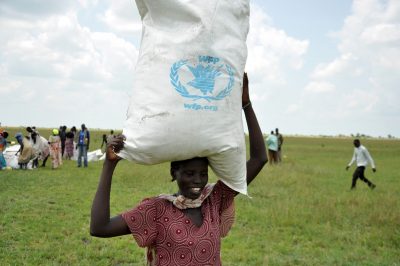By
Peter Louis
Dablual of Mayendit County in the Unity state of South Sudan last week received aid from organisations after more than 35,000 people were reported to be facing food shortage. Mayendit, one of the counties south of Unity state has been one of the areas to witness repeated heavy fighting between government forces and armed opposition. It is also projected to be in Phase 4 (Emergency) between May and July according to the Integrated Food Security Phase Classification (IPC) report, released in May.
Humanitarian access to some of these populations – for both those on the move and those hosting the IDPs, has been restricted in the past and fresh fighting reported this morning has forced people to flee further, making it likely that further distribution would not be easy.
There has been concern that a lack of access to these populations could lead to a humanitarian catastrophe. Following access negotiations with all parties on the ground humanitarian partners are in the process of re-establishing response in some of the remote localities where people need urgent assistance in Mayendit County and other parts of the southern Unity State.
The World Food Programme (WFP) on Saturday conducted distributions in Mayendit headquarters and Dablual. In the latter location WFP is deploying with UNICEF and Samaritan’s Purse as part of the Rapid Response Mechanism (RRM). UNICEF also conducts nutrition screening and assistance while WFP’s partner Samaritan’s Purse, which has staff on the ground, conducts food distributions.
WFP said that they are planning to support an estimated population of over 30,000 people. These people are not all physically living in Dablual. There are many IDPs who are living in the surrounding areas, some living with hosts. The hosts themselves have had very little access to food.
Nyakenrew, one of the displaced, said “There is no food here. Some time back, a plane from an organisation came but it didn’t come back again. We sometimes depended on relatives, you go and you beg from your relative if he has something but with time even they had nothing like us and we all depended on leaves from trees. All our cows were looted and the problem is they even kill children; they don’t differentiate. They raped and killed our girls. I don’t want to talk about the elderlies because we don’t have elderlies left.”
Nyakenrew mentioned that the conflict is what brought her to this camp: “We have been displaced from out homes and our homes have been burnt. We don’t have houses now and we are in the bush. I was in a place called Dob koj and the houses there have been burnt. We now face hunger. We depend on leaves from trees and some fruits from trees in the forest here” she added.
Fighting erupted in Juba, the capital city, in mid December 2013 and rapidly spread to other parts of the country. Jonglei, Upper Nile and Unity states are the most affected by the conflict.
In May 2015, results of the Integrated Food Security Phase Classification analysis, confirmed fears that unrelenting conflict and the onset of the lean season are intensifying alarming levels of hunger – both in conflict-affected areas and in other parts of the country.
Nearly 4.6 million, or 40 percept of the population, will face acute hunger in the next three months. Most of these people are in the conflict-affected states of the Greater Upper Nile (Unity, Upper Nile and Jonglei) and parts of the Greater Bahr el Ghazal (Northern Bahr el Ghazal and Warrap).
WFP is using all means at its disposal – including airdrops, riverboats and distributions of food, cash or vouchers – to reach hungry people in conflict zones with life saving emergency food and nutrition.
The World Food Programme is also supporting vulnerable families in other parts of South Sudan with programmes to improve food security, including school meals and asset-creation initiatives.



No Comments Yet!
You can be first to comment this post!